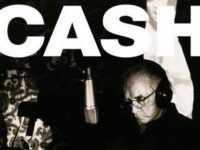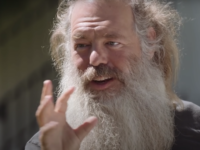Johnny Cash left us, finally, much the same way he arrived — rustic, spiritual, unbent. But something, these belatedly released final recordings made clear, had changed.
Cash died nearly seven years earlier, still in mourning over the absence of his one true love. But not before completing a song cycle that would continue through to this, the capstone American VI: Ain’t No Grave, issued on February 23, 2010 on the anniversary of his birth 78 years ago. He worked until the end, displaying a familiar determination. Johnny Cash’s last session alone produced both this effort and 2006’s American V: A Hundred Highways.
In this way, American VI: Ain’t No Grave couldn’t have begun with a more prophetic lyric: “Ain’t no grave that can hold my body down,” Cash sings in the resolute opener. “Ain’t no grave that can hold my body down, when I hear that trumpet sound, I’m going to rise right out of the ground! Ain’t no grave that can hold my body down.”
Johnny Cash would pass in September of 2003, just months after his spouse June Carter Cash died, lending a stark elegiac tone to much of Ain’t No Grave, the sixth installment in this profoundly moving series produced by Rick Rubin.
Still, the pair avoid sliding off into the funereal. “Cool Water,” the old Bob Nolan tune, will always have a happy gait. “Last Night, I Had The Strangest Dream” is a quiet, oaken prayer for peace in a war-torn world. Sheryl Crow’s “Redemption Day” (the latest in a series of well-placed contemporary compositions selected by Rubin; see Nine Inch Nails’ “Hurt” from 2002) is even more open hearted — boasting a fundamental belief in our own ability to move toward grace, no matter how long it takes. And the winking, island-flavored closer “Aloha Oe” sends Cash shuffling out, pina colada seemingly in hand.
There’s no getting away from Cash’s fate, however — not for the listener, and not for the singer.
Having already lost June, not to mention countless contemporaries, he knows exactly what’s ahead down that dusty road — even if he’s just as unsure as anybody else about what it will take to get there. “I’ve been wandering through this land,” Cash sings, just doing the best I can, trying to find what I was menat to do. And the people I see, look as worried as can be, and it looks like they are wandering too.”
Bolstered by both a brave simplicity and a brutal honesty, American VI: Ain’t No Grave goes on to reframe what made Cash such an illuminating figure in the first place.
In moments like “For the Good Times,” a Kris Kristofferson number freed here from a million maudlin readings, we find a rough-hewn unnostalgic beauty to Cash’s memories. On “I Corinthians 15:55,” the lone original tune, Cash seems to wonder why everybody is so serious about the end of things, anyway. Johnny Cash is ready — it hits you, right in the middle of American VI: Ain’t No Grave, — to see June again. He is ready to die. During “It Don’t Hurt Anymore,” he sings, simply: “At last, I am free.”
The American series did nothing but gain power after its debut in the early 1990s because it also provided an intricately crafted, emotionally challenging road map to taking life’s final steps. For Johnny Cash, there’s a hard-eyed dignity, and we expected that. But also, in the end, he found — he helps us find — a bracing acceptance.
- Nick DeRiso’s Best of 2015 (Rock + Pop): Death Cab for Cutie, Joe Jackson, Toto + Others - January 18, 2016
- Nick DeRiso’s Best of 2015 (Blues, Jazz + R&B): Boz Scaggs, Gavin Harrison, Alabama Shakes - January 10, 2016
- Nick DeRiso’s Best of 2015 (Reissues + Live): John Oates, Led Zeppelin, Yes, Faces + others - January 7, 2016




